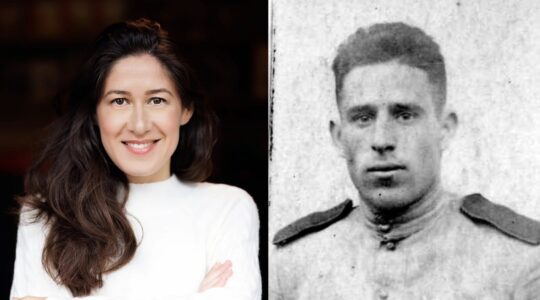A federal appeals court ruling in the civil case of an American teen murdered in Israel is being viewed as a major step forward in the growing courtroom battle against terrorists and their sponsors.
A tribunal of the 7th Circuit Court of Appeals in Chicago last week unanimously upheld the $200 million suit brought by Stanley and Joyce Boim against two U.S.-based Islamic organizations they allege funded the terrorists who killed their son, David, in 1996.
The court rejected the argument brought by the two organizations that U.S. anti-terrorism law does not contain provisions to punish those who aid and abet terrorists.
One of the organizations, the Holy Land Foundation for Relief and Development, has been under scrutiny from state Attorney General Eliot Spitzer, and its funds were frozen by President George W. Bush in the days after Sept. 11.
The Boims, former New Yorkers living in Jerusalem, say the two groups utilize an intricate system to channel money to Hamas, which was designated a terrorist group in 1997 in an executive order by President Bill Clinton. The two men identified as the killers of David Boim, one of whom confessed to Palestinian police that he committed the crime, were known members of Hamas.
While the Boims must still prove their case in court, the ruling could encourage increasing efforts in U.S. courts against the perpetrators of terrorism while scaring off potential donors to groups under scrutiny.
"The court has sent a message to every potential contributor to an organization that engages in terrorism that he or she can be sued for millions of dollars," said Nathan Lewin, the attorney representing the Boims. "I don’t care if they are Muslim or Jewish."
In an interview from Jerusalem, Joyce Boim said that while she was seeking compensatory and punitive damages from the U.S. groups, her intention was to see that "funds for supposedly charitable organizations should be stopped cold."
The suit comes at a time when families of a number of victims of the Sept. 11 attacks on America have taken steps to sue the Saudi kingdom for its alleged role in funding the terrorists, and the families of several terror victims have sued the Palestinian Authority in a Rhode Island court.
Plaintiffs face an uphill battle in such cases because of the tangled web of links between terror groups, foreign governments and various funding sources.
But Stephen Flatow, the New Jersey lawyer who successfully sued Iran over its role in funding Islamic Jihad terrorists who killed his daughter, Alisa, in a 1995 bus bombing in Gaza, called the Chicago ruling "a terrific step."
"One of the problems in forcing claims against entities like Hamas or Islamic Jihad is that they hide behind other organizations and it’s very difficult to pierce the corporate veil," Flatow said. "The fact that the court is allowing this lawsuit to continue doesn’t guarantee victory, but it is a terrific step in the enforcement process."
Steven Emerson of the Investigation Project, a counterterrorism institute, said the lawsuit could impact as many as two dozen domestic organizations suspected of channeling funds to terrorist groups.
"This decision establishes standards and provides a much greater opportunity to sue front groups," he said.
Harvard law professor Alan Dershowitz said the prevailing sense that terrorism has hit home has created a healthy climate for the Boims lawsuit.
"The time couldn’t be better for getting fact-finders to see this case in the right light," he said. "The courts see the situation more realistically. They read the papers. They know that terrorism results from well-organized, well-coordinated and well-financed operations and that charities that send money to these groups are legally and morally reprehensible."
David Boim was 17 when he was gunned down outside his yeshiva in the settlement of Bet El by two Arabs in a passing car. At the time, Palestinian Authority police were engaged in security cooperation with Israel, and later apprehended Amjad Hinawi and Khalil Tawfiq al-Sharif, imprisoning them in 1997. They were released pending trial.
According to court papers, al-Sharif became a suicide bomber, killing five Israelis and injuring 192 others in Jerusalem on Sept. 4, 1997. In 1998, Hinawi was sentenced to 10 years in prison by a Palestinian court.
The Boims’ lawsuit alleges that North American foreign fund-raising amounts to one-third of the budget of the Hamas military wing, and that the Holy Land Foundation and the Quranic Literacy Institute, both of which have offices in Illinois, are the main fronts for Hamas in the United States.
The Quranic Literacy Institute has employed Mohammed Abdul Hamid Khalil Salah as a computer analyst. According to court papers, the FBI has seized $1.4 million in cash and property from Salah, "who is the admitted leader of Hamas and has channeled money for recruiting, organizing and training terrorist operatives in Israel."
The papers also said that the director of Holy Land Foundation has admitted channeling money to Hamas and also has ties to Salah.
The Boims allege that the two groups solicit donations here, launder the funds through an intricate system of real estate deals and Swiss bank accounts, and then wire the money overseas to be used for terror activities, including the attack on David.
The Justice Department is expected later this year to present extensive evidence to the District Court in Washington regarding the activities of the Holy Land Foundation in response to a suit brought by the group to recover the funds frozen by the government.
A brief filed last month in the case includes transcripts and surveillance tapes that allegedly tie foundation leaders to Hamas officials.
Attempts to reach the two groups were not successful. Reuben Headlund, the attorney representing HLF, did not immediately return a call for comment.
Joyce Boim described the ongoing pretrial process as "a horrible experience. We had to sit with them in a room in Chicago and listen to them say they don’t have any money, they have to pass around the collection plate."
Although federal courts seem increasingly hospitable to anti-terrorism suits, plaintiffs have faced a substantial obstacle in the State Department, which sees the litigation as an obstacle to foreign policy objectives. U.S. law shields states recognized as sovereign by the State Department from prosecution in American courts.
In defending the Palestinian Authority, attorney Ramsey Clark has argued that Palestine is a state, which would effectively shield the PA from lawsuits.
"The State Department is wrong," said Dershowitz. "Individuals have the right to get recourse without regard to the impact on foreign policy."
The New York Jewish Week brings you the stories behind the headlines, keeping you connected to Jewish life in New York. Help sustain the reporting you trust by donating today.




